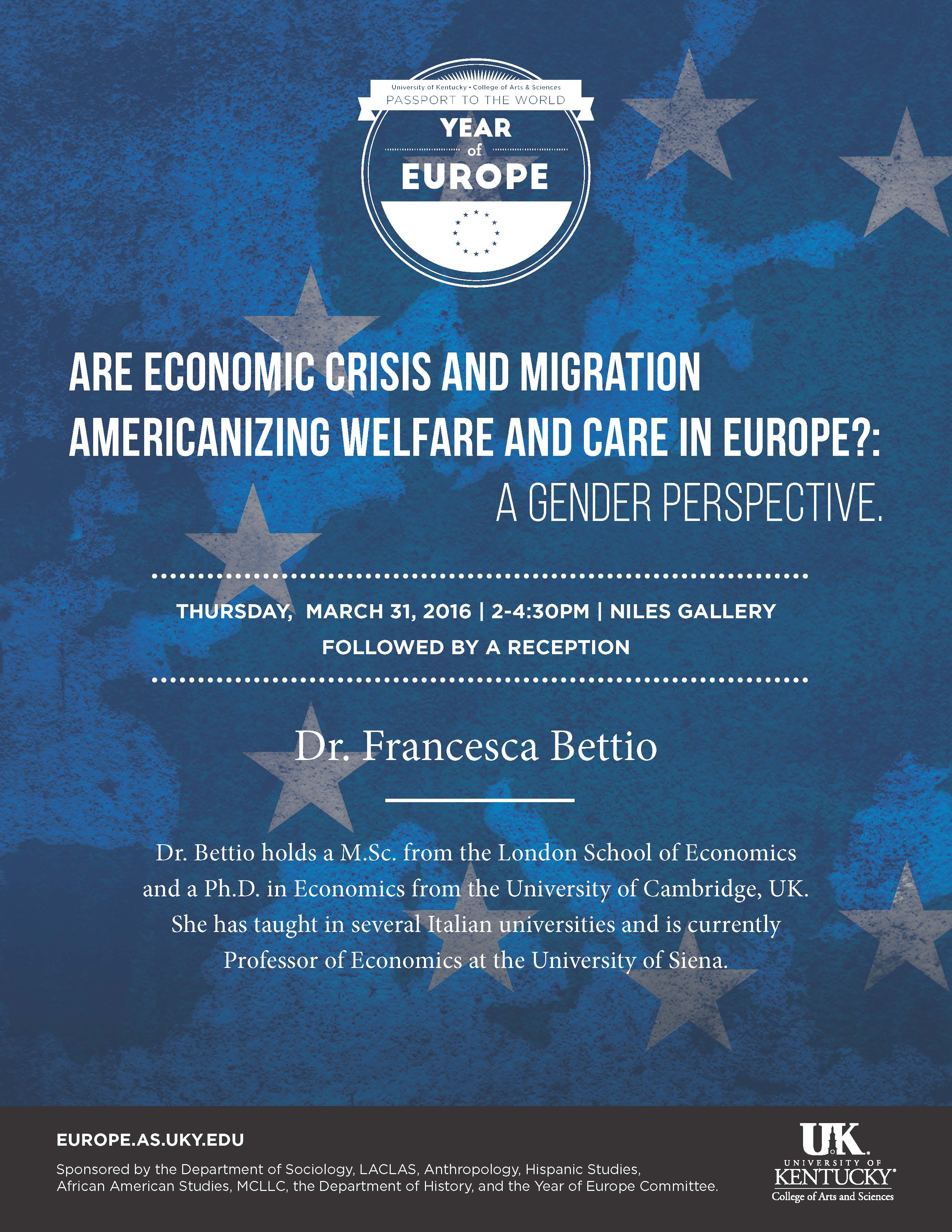Year of Europe
Year of Europe Film Series: Le Havre (Finland/France)
For more information on the film series "Europe Through the Lens: a Festival of Contemporary European Films" visit http://libguides.uky.edu/eurofilm.
Year of Europe Film Series: Le Havre (Finland/France)
For more information on the film series "Europe Through the Lens: a Festival of Contemporary European Films" visit http://libguides.uky.edu/eurofilm.
Translated from the English
Translated from the English
Cloistered Women's Voices Symposium and Concert
Symposium
Cloistered Women’s Voices: Sound, Song and Lyric in Early Modern Convents
March 30-April 1, 2016
University of Kentucky, Lexington KY
In recent years, sound, lyric and song in early modern women’s religious communities has received increased attention from musicologists, historians and literary and cultural studies specialists. Despite renewed scholarly interest, disciplinary and geographic boundaries tend to limit prior approaches. For example, few extant works address the intersection of music and literary cultures in early modern women’s religious communities and none consider convent music-making from a global perspective. As a result, it becomes difficult to draw conclusions about cloistered women’s lyrical and vocal production as a broad cultural practice. The Cloistered Women’s Voices Symposium thus responds to these lacunae by examining song and lyric in convents throughout Europe and the Americas. This comparative and cross-disciplinary scope puts diverse convent music cultures into dialogue and draws out paradigms of voice among cloistered women.
SCHEDULE
Thursday, March 31
6:00 pm—concert; St. Augustine's Chapel, Rose Street
Friday, April 1
Niles Gallery
9:00 am—First session: Voice and Lyric
1. “Reading Lyrics: Miguel de Toledano’s Minerva sacra.” Colleen Baade, Creighton University
2. “The nun’s smooth tongue has sucked her in”: Cloistered Language in Marvell’s Upon Appleton House.” Tessie Prakas, Kenyon College
3. “Songs in the Prison Cell, Songs at the Scaffold: Carmelite Convent Song extramuros, and the case of the Sixteen Carmelites of Compiègne.” Daniel Hanna, Lake Forest University
10:30—Coffee break
11:00—Second session: Sound and Contemplation
4. “Spiritual Soundscapes: La Musique spirituelle (1718) and La Dissection spirituelle of Marie-André Duplessis de Sainte-Hélène of the Hôtel-Dieu of Quebec." Thomas Carr, Harold E. Spencer Emeritus Professor of French
5. “Contrapuntal Voices: Silence in New Spanish Convents.” Sarah Finley, Christopher Newport University
6. “Nuns’ Spiritual Exercises and Music in Early Modern Rome.” Kimberlyn Montford, Trinity University
12:45—Lunch break
2:00—Third session: Performance Practice
7. “A Most Useless Vanity: Venetian Novices Singing at their own Monacations.” Jonathan Glixon, University of Kentucky
8. “Women Singing Low: Bass and Tenor parts in Viennese Convents.” Janet Page, University of Memphis
3:00—Coffee break
3:45—Keynote: "Pænæ Catænæ sunt Præmium Amoris: Bodily Mortification and Mystical Death in Convent Choir Lofts." Craig Monson, Paul Tietjens Professor Emeritus of Music, Washington University, St. Louis, Missouri
Organizers: Mónica Díaz, U of Kentucky; Sarah Finley, Christopher Newport University; Jonathan Glixon, U of Kentucky; Daniel Hanna, Lake Forest College
Cloistered Women's Voices Symposium and Concert
Symposium
Cloistered Women’s Voices: Sound, Song and Lyric in Early Modern Convents
March 30-April 1, 2016
University of Kentucky, Lexington KY
In recent years, sound, lyric and song in early modern women’s religious communities has received increased attention from musicologists, historians and literary and cultural studies specialists. Despite renewed scholarly interest, disciplinary and geographic boundaries tend to limit prior approaches. For example, few extant works address the intersection of music and literary cultures in early modern women’s religious communities and none consider convent music-making from a global perspective. As a result, it becomes difficult to draw conclusions about cloistered women’s lyrical and vocal production as a broad cultural practice. The Cloistered Women’s Voices Symposium thus responds to these lacunae by examining song and lyric in convents throughout Europe and the Americas. This comparative and cross-disciplinary scope puts diverse convent music cultures into dialogue and draws out paradigms of voice among cloistered women.
SCHEDULE
Thursday, March 31
6:00 pm—concert; St. Augustine's Chapel, Rose Street
Friday, April 1
Niles Gallery
9:00 am—First session: Voice and Lyric
1. “Reading Lyrics: Miguel de Toledano’s Minerva sacra.” Colleen Baade, Creighton University
2. “The nun’s smooth tongue has sucked her in”: Cloistered Language in Marvell’s Upon Appleton House.” Tessie Prakas, Kenyon College
3. “Songs in the Prison Cell, Songs at the Scaffold: Carmelite Convent Song extramuros, and the case of the Sixteen Carmelites of Compiègne.” Daniel Hanna, Lake Forest University
10:30—Coffee break
11:00—Second session: Sound and Contemplation
4. “Spiritual Soundscapes: La Musique spirituelle (1718) and La Dissection spirituelle of Marie-André Duplessis de Sainte-Hélène of the Hôtel-Dieu of Quebec." Thomas Carr, Harold E. Spencer Emeritus Professor of French
5. “Contrapuntal Voices: Silence in New Spanish Convents.” Sarah Finley, Christopher Newport University
6. “Nuns’ Spiritual Exercises and Music in Early Modern Rome.” Kimberlyn Montford, Trinity University
12:45—Lunch break
2:00—Third session: Performance Practice
7. “A Most Useless Vanity: Venetian Novices Singing at their own Monacations.” Jonathan Glixon, University of Kentucky
8. “Women Singing Low: Bass and Tenor parts in Viennese Convents.” Janet Page, University of Memphis
3:00—Coffee break
3:45—Keynote: "Pænæ Catænæ sunt Præmium Amoris: Bodily Mortification and Mystical Death in Convent Choir Lofts." Craig Monson, Paul Tietjens Professor Emeritus of Music, Washington University, St. Louis, Missouri
Organizers: Mónica Díaz, U of Kentucky; Sarah Finley, Christopher Newport University; Jonathan Glixon, U of Kentucky; Daniel Hanna, Lake Forest College
Gender, Immigration, Labor Markets, and the Welfare State in Contemporary Europe

Gender, Immigration, Labor Markets, and the Welfare State in Contemporary Europe

Year of Europe Film Series: Dirty Pretty Things (England)
For more information on the film series "Europe Through the Lens: a Festival of Contemporary European Films" visit http://libguides.uky.edu/eurofilm.
